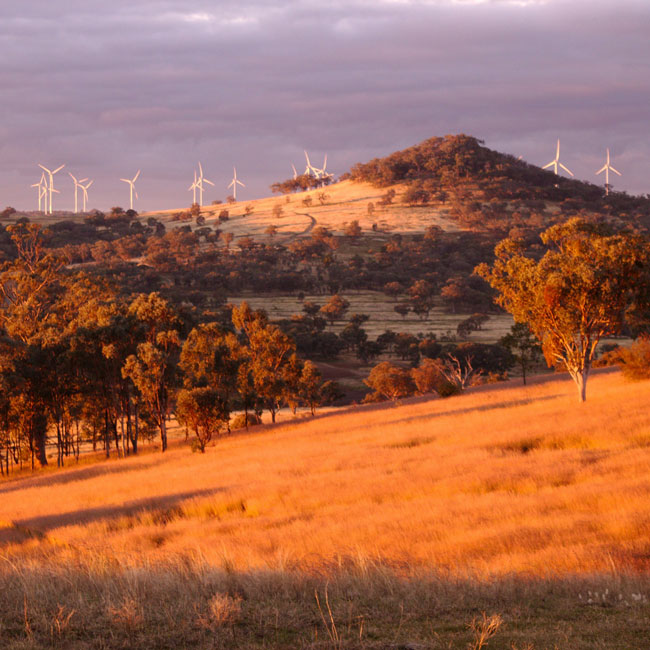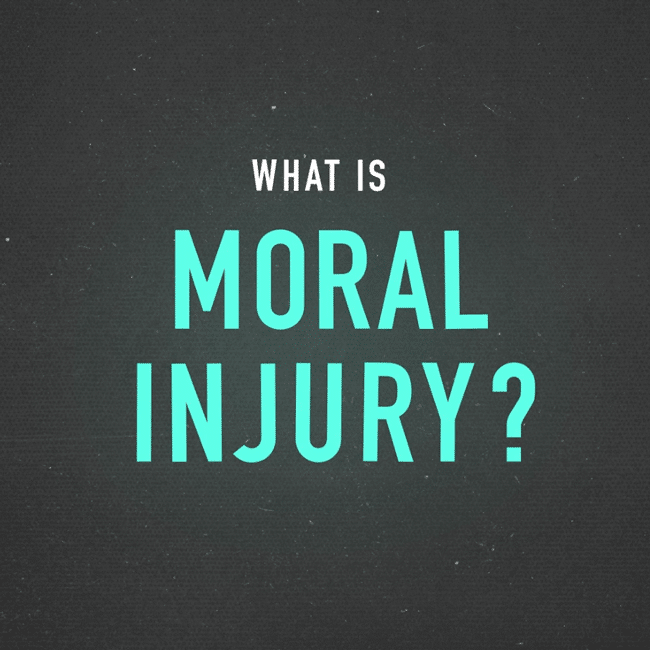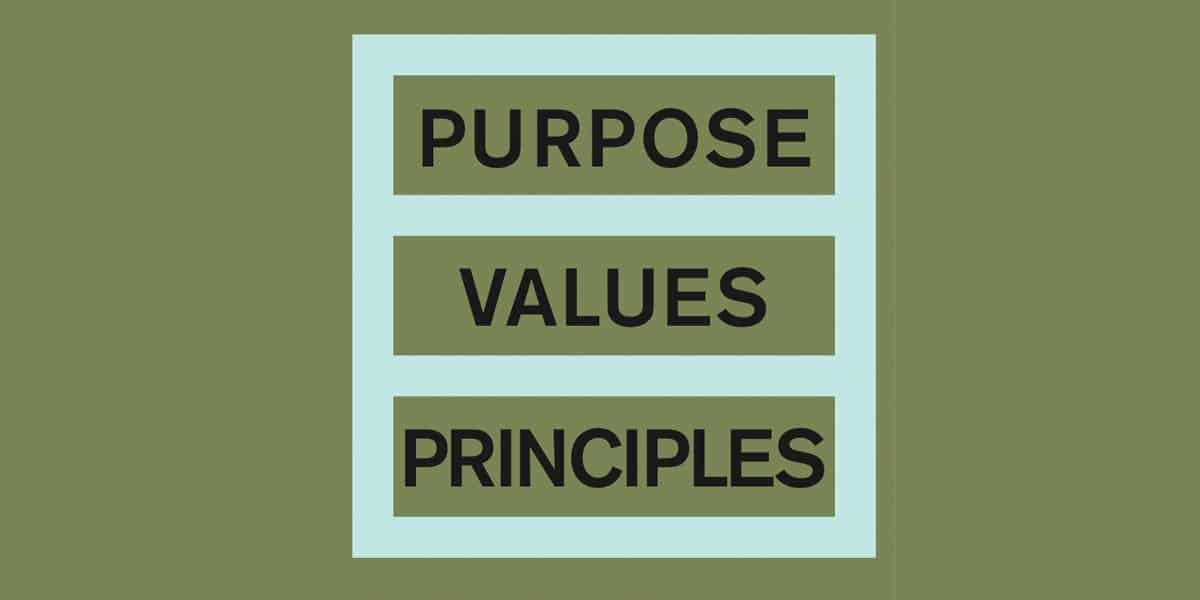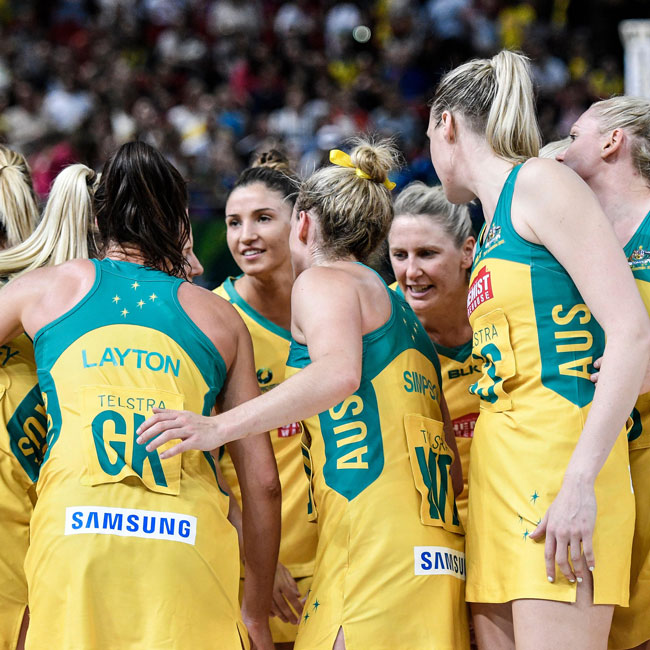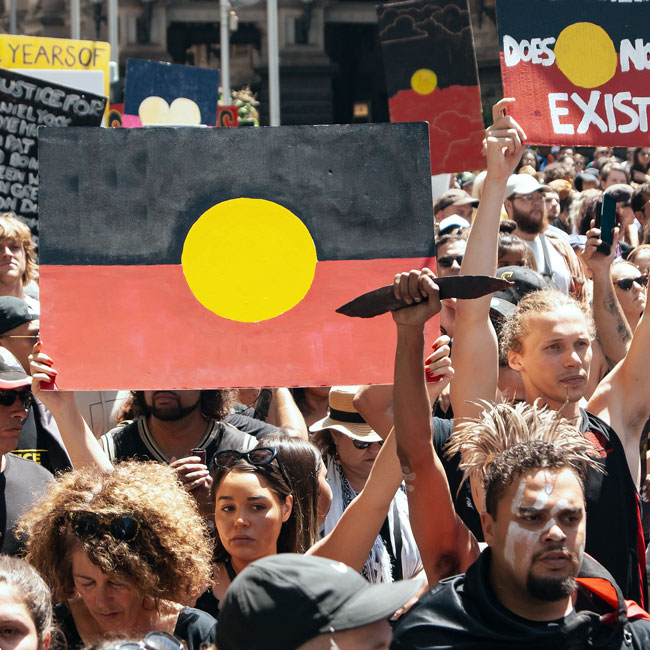Ethics Explainer: Moral injury

Ethics Explainer: Moral injury
ExplainerBusiness + LeadershipRelationships
BY The Ethics Centre 25 JAN 2023
Moral injury occurs when we are forced to violate our deepest ethical values and it can have a serious impact on our wellbeing.
In the 1980s, the American psychiatrist Jonathan Shay was helping veterans of the war in Vietnam deal with the traumas they had experienced. He noticed that many of his patients were experiencing high levels of despair accompanied by feelings of guilt and shame, along with a decline of trust in themselves and others. This led to them disengaging from their friends, family and society at large, accompanied by episodes of suicidality and interpersonal violence.
Shay realised that this was not posttraumatic stress disorder (PTSD), this was something different. Shay saw that these veterans were not just traumatised by what had happened to them, they were ‘wounded’ by what they had done to others. He called this new condition “moral injury,” describing it as a “soul wound inflicted by doing something that violates one’s own ethics, ideals, or attachments”.
The “injury” is to our very self-conception as ethical beings, which is a core aspect of our identity. As Shay stated about his patients, moral injury “deteriorates their character; their ideals, ambitions, and attachments begin to change and shrink.”
Moral injury is, at its heart, an ethical issue. It is caused when we are faced with decisions or directives that force us to challenge or violate our most deeply held ethical values, like if a soldier is forced to endanger civilians or a nurse feels they can’t offer each of their patients the care they deserve due to staff shortages.
Sometimes this ethical compromise can be caused by the circumstances people are placed in, like working in an organisation that is chronically under-resourced. Sometimes it can be caused by management expecting them to do something that goes against their values, like overlooking inappropriate behaviour among colleagues in the workplace in order to protect high performers or revenue generators.
Symptoms
There are several common symptoms of moral injury. The first is guilt. This manifests as intense discomfort and hyper-sensitivity towards how others regard us, and can lead to irritability, denial or projection of negative feelings, such as anger, onto others.
Guilt can tip over into shame, which is a form of intense negative self-evaluation or self-disgust. This is why shame sometimes manifests as stomach pains or digestive issues. Shame can be debilitating and demotivating, causing a negative spiral into despondency.
Excessive guilt and shame can lead to anxiety, which is a feeling of fear that doesn’t have an obvious cause. Anxiety can cause distraction, irritability, fatigue, insomnia as well as body and muscle aches.
Moral injury also challenges our self-image as ethical beings, sometimes leading to us losing trust in our own ability to do what is right. This can rob us of a sense of agency, causing us to feel powerless, becoming passive, despondent and feeling resigned to the forces that act upon us. It can also erode our own moral compass and cause us to question the moral character of others, which can further shake our feeling that the other people and society at large are guided by ethical principles that we value.
The negative emotions and self-assessment that accompany moral injury can also cause us to withdraw from social or emotional engagement with others. This can involve a reluctance to interact socially as well as empathy fatigue, where we have difficulty or lack the desire to share in others’ emotions.
Distinctions
Moral injury is often mistaken for PTSD or burnout, but they are different issues. Burnout is a response to chronic stress due to unreasonable demands, such a relentless workloads, long hours, chronic under resourcing. It can lead to emotional exhaustion and, in extreme cases, depersonalisation, where people feel detached from their lives and just continue on autopilot. But it’s possible to suffer from burnout even if you are not compromising your deepest ethical values; you might feel burnout but still agree that the work you’re doing is worthwhile.
PTSD is a response to witnessing or experiencing intense trauma or threat, especially mortal danger. It can be amplified if the individual survived the danger while those around them, especially close friends or colleagues, did not survive. This could be experienced following a round of poorly managed redundancies, where those who keep their jobs have survivor guilt. Thus, PTSD is typically a response to something that you have witnessed or experienced, whereas moral injury is related to something that you have done (or not been able to do) to others.
Moral injury affects a wide range of industries and professions, from the military to healthcare to government and corporate organisations, and its impacts can be easily overlooked or mistaken for other issues. But with a greater awareness of moral injury and its causes, we’ll be better equipped to prevent and treat it.
If you or someone you know is suffering from moral injury you can contact Ethi-call, a free and independent helpline provided by The Ethics Centre. Trained counsellors will talk you through the ethical dimension of your situation and provide resources to help understand it and to decide on the best course of action. To book a call visit www.ethi-call.com
The Ethics Centre is a thought leader in assessing organisational cultural health and building leadership capability to make good ethical decisions. We have helped a number of organisations across a number of industries deal with moral injury, burnout and PTSD. To arrange a confidential conversation contact the team at consulting@ethics.org.au. Or visit our consulting page to learn more.
Ethics in your inbox.
Get the latest inspiration, intelligence, events & more.
By signing up you agree to our privacy policy
You might be interested in…
Opinion + Analysis
Relationships, Science + Technology
We are being saturated by knowledge. How much is too much?
Opinion + Analysis
Health + Wellbeing, Relationships
Living well or comfortably waiting to die?
Opinion + Analysis
Business + Leadership, Politics + Human Rights
Do diversity initiatives undermine merit?
Opinion + Analysis
Politics + Human Rights, Relationships
To Russia, without love: Are sanctions ethical?
BY The Ethics Centre
The Ethics Centre is a not-for-profit organisation developing innovative programs, services and experiences, designed to bring ethics to the centre of professional and personal life.
Why Australian billionaires must think “less about the size of their yard” and more about philanthropy

Why Australian billionaires must think “less about the size of their yard” and more about philanthropy
Opinion + AnalysisBusiness + Leadership
BY Emma Elsworthy The Ethics Alliance 15 DEC 2022
Australians donated a record $1.16 billion last year but our mega-rich are laggards on the world stage for giving. Assistant Minister for Competition, Charities and Treasury, Andrew Leigh calls for Aussie billionaires to think less about their backyard size and more about their philanthropy.
An Australian-first report from the Centre for Social Impact (CSI) delved into who was giving and how much in 2021, finding a measly 2% of the top earners in the country gave a higher proportion of their income than the everyday Australian.
That’s despite the wealthiest 200 people owning 3.8% of the country’s wealth – some $555 billion – with the top five owning $143.28 billion alone. That means Australia’s giving total is 0.81% of the country’s GDP, behind Canada at 1%, half of New Zealand’s at 1.84%, and less than a third of the US’s, at 2.1%.
Indeed in the US, 90% of people earning over $1 million make tax-deductible donations, compared to only 55% of Australians earning the same amount. Why? The wealthy in Australia just aren’t thinking about giving enough, Leigh tells The Ethics Centre.
“I want the main topic of conversation among Australia’s successful business leaders not to be the size of your yard, but the impact that you’re making with your philanthropy – where your giving is going, how it’s changing lives, how you’re managing to have a transformative impact beyond the business,” Leigh says.
“I’m reaching out to many business leaders who are pioneers in terms of corporate philanthropy, and just asking them a simple question: ‘If you were in my shoes, how would you look to maximise impact giving in Australia?’”
And as the country emerges from the COVID-19 pandemic into a time of economic uncertainty with the cost of living surging, Australia’s charity sector faces new and frightening challenges in providing care to our most vulnerable.
Put simply, “there are more people to help and fewer people who are giving,” Leigh says.
Four out of five community sector charities struggled with an increased demand for services during the pandemic, the CSI report found. About half (54.9%) of aged care charities and income support charities (48%) made a loss or a small surplus in 2021 (whereas 44.2% of religious charities and 41% of emergency relief charities made a surplus).
“Our goal of doubling philanthropy by 2030 really is one that sits outside the business cycle. We want to permanently increase the level of generosity of Australians, not because we want government to step back, but because we think these challenges are so busy that government can’t do it alone,” he says.
And there’s plenty of reason for optimism, Leigh says, amid a growing list of billionaires parting with their wealth in the name of civic responsibility. Last December, Australia’s richest man and Atlassian co-founder Mike Cannon-Brookes and his wife Annie Cannon-Brookes vowed to invest $1.5 billion of their personal wealth to financial and philanthropic ventures aimed at fighting climate change.
Overseas, Bill Gates has pledged to part with “virtually all” of his wealth, while Meta’s Mark Zuckerberg made a 2015 pledge to donate 99% of his Facebook shares to charity. In September, Patagonia’s founder donated his entire company to the fight against climate change.
“I think it’s really apparent that a lot of the successful technology entrepreneurs in Australia have the mindset that they don’t want to leave most of their wealth to their kids. They want to give it back to the community,” Leigh says.
So how can Australian businesses emulate this groundswell to give? Consecutive lockdowns saw a reduction in corporate volunteering and pro bono services, replaced by corporate investments of products and cash. Leigh says this is a valuable opportunity to evolve our concept of giving into “impact giving”.
“We’re actually seeing quite a shift in corporate volunteering away from the sort of ‘let’s go and paint a fence on Friday’, to ‘let’s match up our skills to what the sector needs’ – more planned and more intentional corporate volunteering,” he says.
Leigh continues there is an abundance of unused corporate volunteering hours in the economy, and the MP has been meeting with businesses and the philanthropic community to discuss the smartest way to give back – the key to this, he says, is thinking about one’s “comparative advantage”, the special sauce that the next firm doesn’t have.
“The free training that’s being provided to community organisations by Canva, for example, allows designers from disadvantaged backgrounds to learn IT and design skills and get better earnings as a result. That’s something that only Canva can do.”
Leigh says for him it comes down to “putting the S back into ESG” – for Australian corporations and the billionaires that head them up to think deeply about the value of their social impact on Australia’s most needy.
“Let’s encourage a race to the top in supporting community organisations,” Leigh says.
Ethics in your inbox.
Get the latest inspiration, intelligence, events & more.
By signing up you agree to our privacy policy
You might be interested in…
Opinion + Analysis
Business + Leadership
Survivor bias: Is hardship the only way to show dedication?
Opinion + Analysis
Business + Leadership, Politics + Human Rights, Science + Technology
Not too late: regaining control of your data
Opinion + Analysis
Business + Leadership, Relationships
What makes a business honest and trustworthy?
Opinion + Analysis
Business + Leadership, Relationships
There’s no good reason to keep women off the front lines
BY Emma Elsworthy
Before joining Crikey in 2021 as a journalist and newsletter editor, Emma was a breaking news reporter in the ABC’s Sydney newsroom, a journalist for BBC Australia, and a journalist within Fairfax Media’s regional network. She was part of a team awarded a Walkley for coverage of the 2019-2020 bushfire crisis, and won the Australian Press Council prize in 2013.
BY The Ethics Alliance
The Ethics Alliance is a community of organisations sharing insights and learning together, to find a better way of doing business. The Alliance is an initiative of The Ethics Centre.
Why we can’t learn from our past (and shouldn't try to)

Why we can’t learn from our past (and shouldn’t try to)
Opinion + AnalysisBusiness + Leadership
BY Emma Elsworthy 12 DEC 2022
Businesses make up around two-thirds of psychic Denise Litchfield’s readings. The Australian’s clairvoyant method “looks into the energy around their business and sees if a project needs tweaking”.
For instance, she tells journalist and author Gary Nunn, she once spotted an error in an email sequence that purportedly saved a person “thousands”.
Nunn’s book, The Psychic Tests, delves into the multi-billion dollar industry of predicting the future using what we know, and why humans are so keen to do so. A healthy sceptic, Nunn was astounded to learn psychics are called upon by everyone from your average Joe or Jane right up to CEOs and even presidents.
Former BBY chairman Glenn Rosewall, who oversaw the largest failure of an Australian stockbroking firm since the financial crisis, allegedly asked a psychic advice for wealth clues for four years, including insights about the stockbroking firm’s astrological charts, hiring staff, and budgets.
Even former US president Ronald Reagan and wife Nancy called upon astrology to guide their schedules in what was called “the most closely guarded domestic secret of the Reagan White House”, though it was not used in forming policies or decision-making, Reagan assured the public.
Cash-hungry mysticism aside, the powerful seeking predictions speaks to a deeply-held human emotion to prepare oneself for the future’s challenges. But as we enter into an era with several of what Adam Tooze dubs overlapping “tipping points”, we may find no amount of looking back and learning from our mistakes will help.
Tooze, a British historian and Director of the European Institute, told The Festival of Dangerous Ideas that there is “a fundamental paradox at work” – that is, “a desire to work from history, the sense that we can go nowhere else for inspiration, but to our past experience” to equip ourselves for what’s coming.
But, Tooze continues, “this is the issue of tipping points – that fundamentally oppressive sense that we live under in the current moment – that we are years, weeks, possibly hours away from some transformative event that is going to change the world, like the pandemic did to us in a matter of days in early 2020”.
Fast-forward to now and still-deadly pandemic, a rapidly heating planet, a war in Ukraine, and several key nations including the US and EU careening towards a recession next year doesn’t exactly make building a plan for the future straightforward. But that’s exactly what Treasurer Jim Chalmers did when he crafted the Albanese government’s austere first budget last month.
While in opposition, Chalmers told the Australian Chamber of Commerce and Industry that we have just lived through “the weakest decade of growth since the 1930s, stagnant business investment, productivity and wages, growing debt,” while simultaneously facing uncertainty about “the consequences of floods and war, when interest rates will rise, the challenges of falling real wages and skills shortages – all against the backdrop of a lingering pandemic”.
This, Tooze says, cuts to the bone of the problem of trying to predict the “radical future”. “What would it actually mean to craft policy which addressed the radical novelty, which our best guess suggests what the future holds in store?” he asks.
Sure, Tooze continues, we “entrust this task to experts, it could be their job to prepare endlessly for this radical future that will be radically different”. But, he says, it’s an incredibly oppressive burden that can “destabilise your sense of normality, it tends towards the apocalyptic, it tends towards almost a fantastical notion of the future”.
“And if it’s the difference between the past and the present, that opens up the space of history, then learning from history is going to be an inherently doomed exercise from the very beginning,” Tooze says.
Perhaps it is up to our private sector to save the world. Elon Musk might be making headlines for his disruptive leadership at Twitter (including an exodus of three-quarters of the staff), but Tesla remains one of the world’s most valuable companies in the world and the number one most valuable automaker, with a market capitalisation of more than US$840 billion.
How? By breaking new ground, rather than looking back, in accelerating the world’s transition to sustainable energy with electric cars, solar and integrated renewable energy solutions for homes and businesses, taking strides to slash the world’s automotive emissions (which make up 10% of Australia’s total) and cashing in along the way.
“After all, one person’s unsolved issue is another person’s business opportunity,” as Tooze put it.
But is appointing brainy futurist technocrats like Musk or successful Wall Street billionaires like the newly-minted British PM Rishi Sunak the solution to an unclear future? Tooze says it brings up a whole lot of other questions – namely whose interests would they really be serving, and how could we be sure they were drawing “the right inferences” from the past?
“The financial interests which are doing that job for them really have free rein for those elites, we would need them to be acting in a vacuum of social power, we would need them to be free to enact as it were, the technocratic logic, the derivations of the past, the present and the future … that we want to see them doing,” Tooze says.
If there’s one thing we can take from the past with confidence, he continues, it’s English economist John Maynard Keynes telling the BBC back in 1943 that “anything we can actually do, we can afford” – we are “immeasurably richer than our predecessors”, Maynard Keynes asked. So why does “sophistry, some fallacy, govern our collective action”?
In other words, Tooze says, we have the money and we have the brains to solve our challenges. Reimagining the system may remain a lofty goal for idealists, but the self-determining reality is that it comes down to the individual. “The problem is actually concerning ourselves getting our act together to do the things,” he says.
We have the money and we have the brains to solve our challenges. Reimagining the system may remain a lofty goal for idealists, but the self-determining reality is that it comes down to the individual.
“We will make shifts, we will look for compromises, we will find hustles. We’ll differ, we’ll react, we’ll adapt, we’ll crisis fight, we will ameliorate, and we will slouch, not towards utopia or disaster, it seems to me, but potentially, possibly, towards coping,” Tooze concludes.
“The central question that I think we need to focus on is this issue of timing. Is it going to be enough? Is it going to be fast enough? … Will we be able to keep pace with this reality that we face and that preoccupies and concerns us all?”
Tune into Adam Tooze’s FODI discussion, F=fail
Ethics in your inbox.
Get the latest inspiration, intelligence, events & more.
By signing up you agree to our privacy policy
You might be interested in…
Opinion + Analysis
Health + Wellbeing, Business + Leadership
Repairing moral injury: The role of EdEthics in supporting moral integrity in teaching
Opinion + Analysis
Business + Leadership
The role of ethics in commercial and professional relationships
Opinion + Analysis
Business + Leadership
How a Shadow Values Review can improve your organisation
Opinion + Analysis
Business + Leadership, Health + Wellbeing, Society + Culture
Ethical concerns in sport: How to solve the crisis
BY Emma Elsworthy
Before joining Crikey in 2021 as a journalist and newsletter editor, Emma was a breaking news reporter in the ABC’s Sydney newsroom, a journalist for BBC Australia, and a journalist within Fairfax Media’s regional network. She was part of a team awarded a Walkley for coverage of the 2019-2020 bushfire crisis, and won the Australian Press Council prize in 2013.
Sir Geoff Mulgan on what makes a good leader

Sir Geoff Mulgan on what makes a good leader
Opinion + AnalysisBusiness + Leadership
BY The Ethics Centre 16 NOV 2022
Sir Geoff Mulgan has had a world of careers. Currently Professor of Collective Intelligence, Public Policy and Social Innovation at University College London, Mulgan discusses trust, power and what makes a good leader.
“There’s a risk in any relationship of power that it can amplify your vices as well as your virtues – vices of vindictiveness or meanness, of spirit or dishonesty. And I’m sure there’s some of that in me, probably because of my character faced by pressures and threats I’d be more likely just to run away and resign, rather than to become a sort of evil Adolf Hitler in the bunker type but you certainly see this in many other people.”
Geoff Mulgan has spent his entire career musing over the question: what makes a good leader? And not only that, but how you cultivate those skills and that mindset without becoming …a psychopath. This thinking prompted Geoff to write a book on this subject, in which he critiques the strong traditions within Christianity and Chinese philosophy. He explores the idea that what constitutes a good leader essentially depends on the ethics of the individual – that, if only you could find the right person for the right job everything would go swimmingly… through his vast research and experience, Geoff says this is completely wrong.
“We are creatures of our context. We are far more likely to be good leaders if there are constraints and pressures, if what we do is visible, if there are balancing forces and many people. Even apparently quite good people, if they can get away with things, will get away with those and they may start quite good. But five, ten, let alone 15 years later, if they’re still in power, they become evil monsters and again and again we see that at the global level.”
Are leaders scared of wisdom?
It’s in a leader’s interest to elicit a sense of awe and respect in their followers. They should be in possession of higher knowledge that can justify to those who work for them that they are worthy of that position. According to Geoff, that is why no leader can ever be completely transparent as they need to maintain this sense of mystery about their workings.
“As a leader I think you have to maintain an opacity, a sort of mystery about your knowledge and wisdom. You see it very clearly in how people talk about Putin or Modi or Xi. They wanted to project onto them this sort of genius, brilliant tactical, strategic genius, which we couldn’t understand. It’s sort of beyond comprehension, but we just sit back and admire it.“
And Geoff sees this behaviour amongst business leaders all the time – “the hagiographic magazine articles and books trying to cultivate an aura, a mysterious magical genius around their insights… which then suddenly collapses when the share price drops.”
Declining trust in institutions
When Geoff was working within the British government he said one of the biggest concerns internally was wavering trust in public institutions. As a result, he lead a large scale project under former UK Prime Minister Tony Blair asking the question: what could be learnt from how public institutions had lost and regained trust? He found the learnings for rebuilding trust were simple:
- Publicly acknowledge and apologise when something has gone wrong
- Articulate your moral purpose
- Perform your core function competently
The key positive that Geoff took away from this research was that: the problem of trust and trustworthiness is actually a fixable problem if you acknowledge it clearly and if you have the courage to really deal with it on these three key dimensions.
Is it possible to lead without getting your hands dirty?
“One of the weird things about leadership is you need a dual mind all the time of apparently opposite qualities – arrogance and humility, toughness and sensitivity, which need constantly replenishing and keeping in a balance… And if you drift too far in either direction, you won’t function very well.”
Geoff set up a young leadership training program in the UK, called “Uprising” and he explains the two dualities that he endeavoured to instil in the course which are:
- You have to be tough and have a thick skin. You’ll need to do things that are unpopular and unpleasant like firing people and closing things down and you need to be psychologically prepared to do that.
- On the flip side you also need to maintain your sensitivity, and not allow the aforementioned thick skin to destroy your ability to be kind and virtuous.
The second duality is: arrogance and humility
- Anyone becoming a leader needs to have a sense of arrogance, they need to believe that they are genuinely better than a million other people who could fill the role. Arrogance isn’t a bad thing, it’s a necessary thing to overcome setbacks, the personal attacks, the social media trolling and everything else that comes with being a public figure.
- But you also need to be humble. The humility to constantly learn and be open to new ideas.
In his experience, it is the young leaders who can manage to keep both of these sets of dualities in harmony who are the most successful.
The leaders of the future
We have a difficult few decades ahead of us, one that will be characterised by the accelerating climate crisis, widening inequality, austerity, and increasing inflation. Geoff believes that we will need to elevate the best people into positions of power if we are to emerge from the other side of this tumultuous time unscathed. His biggest fear is that, over the next few years the sorts of individuals who would make excellent leaders will shy away from the job because it’s too risky or too damaging to their private life, or just too difficult, and so we must persuade and elevate these individuals who possess that duality of arrogance and humility to put themselves forward and act.
“At the very heart of leadership is some sense of obligation and service to the whole community you are part of, realising almost everything you have has been given to you by others… Very little is created by yourself. And that gift requires a gift back.”
AUDIO: Listen to the full podcast discussion above
Sir Geoff Mulgan is Professor of Collective Intelligence, Public Policy & Social Innovation at University College London (UCL). He was CEO of Nesta, the UK’s innovation foundation from 2011-2019. From 1997-2004 Geoff had roles in UK government including director of the Government’s Strategy Unit and head of policy in the Prime Minister’s office. Geoff advises many governments, businesses, NGOs and foundations around the world. He has been a reporter on BBC TV and radio and was the founder/cofounder of many organisations, including Demos, Uprising, the Social Innovation Exchange and Action for Happiness. He has a PhD in telecommunications and has been visiting professor at LSE and Melbourne University, and senior visiting scholar at Harvard University.
Find out more about other conversations in the Leading with Purpose podcast. Delve into more articles and podcasts like this by signing up to our Professional Ethics Quarterly newsletter.
Ethics in your inbox.
Get the latest inspiration, intelligence, events & more.
By signing up you agree to our privacy policy
You might be interested in…
Opinion + Analysis
Business + Leadership
Why we can’t learn from our past (and shouldn’t try to)
Opinion + Analysis
Business + Leadership
The dangers of being overworked and stressed out
WATCH
Business + Leadership
The thorny ethics of corporate sponsorships
Opinion + Analysis
Climate + Environment, Business + Leadership
We’re in this together: The ethics of cooperation in climate action and rural industry
BY The Ethics Centre
The Ethics Centre is a not-for-profit organisation developing innovative programs, services and experiences, designed to bring ethics to the centre of professional and personal life.
Susan Lloyd-Hurwitz on diversity and urban sustainability

Susan Lloyd-Hurwitz on diversity and urban sustainability
Opinion + AnalysisBusiness + Leadership
BY The Ethics Centre 16 NOV 2022
Susan Lloyd-Hurwitz is the CEO of Mirvac, one of Australia’s largest and most respected property groups. Driven by the company’s purpose, to Reimagine Urban Life, Susan talks about how we can redefine the landscape and create more sustainable, connected and vibrant urban environments, leaving a legacy for generations to come.
“When you’re in high school you can only imagine doing the jobs you can see – you can think about being a doctor, a nurse, a lawyer because those jobs exist. But I always say to my own children that the jobs that they’re going to do don’t even exist yet.”
Susan’s parents took a huge risk when they migrated from Belfast in Northern Ireland to Australia, during the Winter of Discontent in 1978 which was characterised by widespread strikes in the public and private sector. At the time she didn’t think much of it, but upon reflection admires the sacrifices her parents made to give her a better life. First in her family to attend university, Susan completed an undergraduate law degree, but upon completion the notion of being a full time lawyer didn’t appeal to her. Deciding to study urban geography, completing a thesis on the migration of Icelanders to Australia, she says it was this rather left field thesis that set her on the path to become the CEO of Mirvac.
“In one of those moments of serendipity I called my university supervisor and said “what does someone like me do for a job?” And he said he’d had a call that very day from Knight Frank, who were looking for a researcher. And I thought, I don’t know the first thing about real estate, but I can analyse, I can write, so why not? And I jumped into real estate and 30 plus years later I’m still in the industry, having worked all around the world for iconic companies. And it was all just that one moment, one phone call to my supervisor launched me off in this direction.”
Striving for a more diverse workplace
“At Mirvac I have tried very hard to ensure we are as gender diverse as possible, and not just gender diversity, gender is just one element of it – we have a full diversity and inclusion effort going on all the time.”
The academic research into diversity is clear: diverse groups make better decisions than homogeneous ones. It’s proven across cultures, across times and across industries. Susan believes that business leaders must be absolutely conscious at all times about diversity within their work force, because if you don’t play close attention, people default to the practice of hiring those most like them. The problem is, that while some elements of diversity are easily marked, diversity of ideas and thought is a lot harder to measure, she says, “it’s not just about having 50% females at the table, it’s a lot deeper than that. You can only measure the things that are obvious, like cultural background or sexual orientation or gender. You can measure those things, and just hope that they all bring some diversity of thought.”
“I’m very, very proud that at Mirvac we have a zero like for like gender pay gap and have maintained that for six years. And it is very hard to maintain if you if you take your eye off for one minute, the gender pay gap, with all the best intentioned in the world comes creeping back into the organisation.”
What keeps Susan Lloyd-Hurwitz up at night?
“The pace of house price growth is simply unsustainable, many multiples of times greater than wage inflation, which is very anaemic. So it is something that does need urgently to be addressed.”
Housing affordability is one of the most important challenges of our time, and Susan believes the problem lies with supply, “We simply don’t do enough dwellings for the growth of household formation in this country. It is a very serious problem and better or worse in different parts of Australia.” When thinking about solutions to the housing crisis and how we might build the cities of the future, Susan has proven that she thinks very much outside the box, conceiving of the idea of “a house with no bills”. “Imagine if you could live in a house and never pay another energy or water bill. Wouldn’t it be transformational for millions of people. What if we could design a different way of building homes so that we were creating no waste?”
A shift towards a more sustainable future
“The business of business is not just business. It is a lot broader than that. People sign up for a noble mission.”
Ten years ago when Mirvac launched the “This Changes Everything” sustainability strategy, with the goal of being net positive in waste water energy by 2030 (without yet having the technology to do so) people thought she was mad. “senior members of industry said you should never set targets that you don’t know how to meet”. Despite the opposition, Susan doggedly pushed on, and fast forward to 2022, Mirvac is now net positive in scope one, and in scope two emissions are 9 years ahead of schedule. She speaks about how rapidly the notion of sustainability is changing at every level of business from the C-suite to the consumer, “our residential customers who ten years ago, if you were talking to them about sustainability upgrades in their home or apartment, they would hear corporate spin and greenwash. And now they buy sustainability upgrades because they have a desire to live in a more impactful way and with a better impact on the planet.”
“Mirvac people generally don’t wake up in the morning and think, I’m going to go generate some earnings per share today. But they do get up in the morning and think about the legacy that they’re going to leave, how they’re going to push forward design and how they’re going to think about how we can design out our waste from our sites. Those are the things that get Mirvac people motivated, and they’re an extremely passionate group of people dedicated to leaving the world a better place than when we found it.”
AUDIO: Listen to the full podcast discussion above
Susan Lloyd-Hurwitz was appointed Chief Executive Officer & Managing Director in August 2012 and a Director of Mirvac Board in November 2012. Prior to this Susan was Managing Director at LaSalle Investment Management. Susan has also held senior executive positions at MGPA, Macquarie Group and Lend Lease Corporation, working in Australia, the US and Europe.
Susan is a Director of the Business Council of Australia, member of the NSW Public Service Commission Advisory Board, a member of the INSEAD Global Board, a Trustee of the Australian Museum Foundation, and the immediate past Chair of the Green Building Council of Australia. She holds a Bachelor of Arts (Hons) from the University of Sydney and an MBA (Distinction) from INSEAD (France).
Find out more about other conversations in the Leading with Purpose podcast. Delve into more articles and podcasts like this by signing up to our Professional Ethics Quarterly newsletter.
Ethics in your inbox.
Get the latest inspiration, intelligence, events & more.
By signing up you agree to our privacy policy
You might be interested in…
Explainer
Business + Leadership
Ethics Explainer: Social license to operate
Opinion + Analysis
Business + Leadership
Why we can’t learn from our past (and shouldn’t try to)
Opinion + Analysis
Business + Leadership, Politics + Human Rights
Vaccination guidelines for businesses
Opinion + Analysis
Business + Leadership, Politics + Human Rights, Relationships
Tim Soutphommasane on free speech, nationalism and civil society
BY The Ethics Centre
The Ethics Centre is a not-for-profit organisation developing innovative programs, services and experiences, designed to bring ethics to the centre of professional and personal life.
Tim Walker on finding the right leader

Tim Walker on finding the right leader
Opinion + AnalysisBusiness + Leadership
BY The Ethics Centre 16 NOV 2022
Tim Walker was Former Chief Executive and Artistic Director of the London Philharmonic Orchestra for over twenty years. Balancing its long and distinguished history with a reputation as one of the UK’s most adventurous and forward-looking orchestras, Walker discusses what it takes to grow a profitable business and find the right leader.
Tim Walker was nine when he started learning how to play the piano, and it was only upon attending his very first orchestra, that he realised how much more fun it was to play with other people. So that night, when he arrived home Tim promptly begged his parents to let him start learning the violin too. As a child, Tim was part of the youth orchestra at school, but after a while found it wasn’t really for him… but it was the notion of managing an orchestra, a job which still had that sense of creativity and community which had stolen his heart.
Finding the right leader
“Yes the conductor holds the musicians together but he or she is also using his or her knowledge and intellect to take the written note of the composer and turn it into something that communicates with us in the audience in a very visceral sense, I would say, because it’s not only something that should hit the heart, I think it also needs to hit the head as well.”
While the musicians in the London Philharmonic Orchestra are some of the most talented in the world, it’s the addition of the right conductor that really helps the players shine. The conductor’s role is to unify all the players to one single interpretation of the music, and while the experience of being in a symphony is entirely collaborative, someone needs to ensure everything is flowing seamlessly. But finding the right person for the job hasn’t always been easy. Traditionally in the 19th and 20th centuries, it wasn’t uncommon for a conductor to lead with an iron fist, however as times have changed, so too have conductor styles.
Growing a profitable business
“Interestingly, the London Philharmonic is one of the few orchestras in the world that actually made money from international touring.”
Before Tim joined the London Philharmonic, the company was solely focused on pursuing profit – the board justified each decision by demonstrating how it would contribute to the bottom line. According to Tim, many people make the mistake of thinking just because the individual elements of an enterprise can pay for themselves, then the sum total will be a sustainable enterprise. However, Tim says there are some avenues that need to be pursued not because they generate profit, but rather because doing those things positions the orchestra for the future. As a result, under Tim’s guidance the London Philharmonic recorded all the national anthems for the London Olympics and played at the Queen’s jubilee, not because they were profitable – but because they intrinsically felt like the right thing to do.
Do people still care about orchestras?
“I think, the people do take for granted a lot of the music in their lives as being sort of like wallpaper. I remember when I was talking to somebody who may not know the London Philharmonic, but as soon as I say we recorded all the soundtracks for The Lord of the Rings, suddenly they understand… But they don’t really.”
Over Tim’s twenty year tenure as Artistic Director and Chief Executive of the London Philharmonic, he reveals the hardest part of the job was just keeping everything going. The dilemma is though some would argue that enjoying art is a necessity, music is not the equivalent of food and basic services, so the purchasing of a concert ticket is something that in times of financial stress slows or stops altogether. “You can’t let the institution die on your watch… you’re responsible for 150 full time and 75 part time employees all dependent on ensuring that they can pay their mortgages and put bread on the table.”
Tim highlights that these last few years with COVID-19 have been particularly challenging as audiences are not flocking back as they had hoped.
Tim believes the way to forge a path out of the pandemic is to remind audiences that real people are making this music. The need for live music will never go away, but when you have 200 people whose livelihoods rely on ticket sales, then large orchestras won’t be around for a long time unless we start buying tickets.
“When you care for something, you’ve also got to care for how it’s maintained. So there needs to be a cost to care. And the care for orchestras is in people making the effort to actually go to concerts and appreciate what they have.”
AUDIO: Listen to the full podcast discussion above
Timothy Walker CBE AM Hon RCM was Chief Executive and Artistic Director of the London Philharmonic Orchestra. He was formerly the founder and Chief Executive of World Orchestras and prior General Manager of the Australian Chamber Orchestra. Mr Walker was on the Board of the International Society for the Performing Arts and was Chair of the Association of British Orchestras.
He was an inaugural member of the Australian International Cultural Council, and has served as a director of the London Philharmonic Orchestra, the Henry Wood Hall Trust and the Rachmaninoff Foundation.
Mr Walker has an honours degree in Arts, a Diploma of Music and a Diploma of Education from the University of Tasmania and a Diploma of Financial Management from the University of New England. He has been a consultant to the Australia Council, Create NSW, Creative Victoria, The Australian Ballet, the Australian Festival of Chamber Music, the Tasmanian Symphony Orchestra, the Sydney Conservatorium of Music and the Orcquestra Sinfonica do Estado de Sao Paulo.
Find out more about other conversations in the Leading with Purpose podcast. Delve into more articles and podcasts like this by signing up to our Professional Ethics Quarterly newsletter.
Ethics in your inbox.
Get the latest inspiration, intelligence, events & more.
By signing up you agree to our privacy policy
You might be interested in…
Opinion + Analysis
Business + Leadership
How avoiding shadow values can help change your organisational culture
Opinion + Analysis
Business + Leadership
Why trust-building strategies should get the benefit of the doubt
WATCH
Health + Wellbeing, Business + Leadership
Moral injury
Opinion + Analysis
Business + Leadership, Science + Technology
People first: How to make our digital services work for us rather than against us
BY The Ethics Centre
The Ethics Centre is a not-for-profit organisation developing innovative programs, services and experiences, designed to bring ethics to the centre of professional and personal life.
Roshni Hegerman on creativity and constructing an empowered culture

Roshni Hegerman on creativity and constructing an empowered culture
Opinion + AnalysisBusiness + Leadership
BY The Ethics Centre 16 NOV 2022
Roshni Hegerman is one of the most awarded strategic thinkers globally. Currently JPAC Market Maker and Experience Director across sustainability and people with Oracle, she discusses creativity, psychological safety and how to construct an empowered culture.
When Roshni was a little girl growing up in India, she didn’t have dreams of being an executive or a director, she had much more humble aspirations to be a social worker. Though her parents didn’t feel it was a career path that could support a family long term, Roshni had her heart set on working with people at a local level.
With this in mind, she studied sociology and psychology in college, but then drifted into journalism and communications, which is where her marketing and communications career really begun. Although, she never did realise the goal of becoming a social worker, the ethos of social work and community has informed all of her decision making she says, “I get realy excited by the power of ideas and how they can connect with people and actually drive either a shift in perception or a shift in behaviour or give people a different lens to kind of view the world through that they wouldn’t have typically viewed it through.”
Be a radiator, not a drain
“I think that the traditional sense of creativity probably isn’t as valued as it could be. I think the use of creativity is to innovate and to do things differently and to think about how you’re going to connect in and change things in a positive way. So from that perspective, I actually think that creative thinking is the only thing that cannot be automated.”
Roshni believes that in the modern workplace, as we shift full speed into the world of automation, creativity and the capacity to think outside the box will actually be the most important skill set for young leaders and changemakers of the future.
One of the things that has stuck with her throughout her professional career is to “be a radiator not a drain”. Rather than be a drain she says, sucking the energy out of the room by sticking to the rules and following traditions, we should be radiators – empowering others, generating ideas, and inspiring new ways of thinking. “I think people are starting to realise that if you’re going to continue to do the same thing and get the same result, and the end and it’s not a positive one, then something has to change.”
Roshni often reflects on her professional practice asking a few key questions:
- How can I use my influence to be more of a radiator?
- Is there a more interesting or different direction we could consider?
- What’s stopping us from being more passionate about a project?
- How can I generate enthusiasm in my team?
- Embrace new and innovative ideas
She suggests that if you can be more of a radiator in your workplace, then people will naturally gravitate towards you, there will be less resistance to your ideas.
People who feel safe have the best ideas
“It’s when you feel like you have to meet a quota and you have to get something done that you tend to revert back to what you know and you don’t feel safe to kind of go out of that box and try something different. It’s when you have an organisation where employees feel safe to kind of give something a go and they’re empowered to be able to do that.”
In order to truly embrace one’s inner radiator, one must feel safe and confident within their team to share their ideas without fear of criticism.
Throughout her career, Roshni has explored the idea of psychological safety in the workplace environment. She suggests as leaders it’s important to create a space of safety in the workplace that allows people to feel more open to being more vulnerable whilst confident enough to have their ideas challenged.
She says, “I think it is very important to create an environment where where you don’t feel threatened by the ideas that you have. There needs to be an environment that allows you to feel at ease with sharing kind of a strong point of view, regardless of which direction you come from.”
Roshi works hard to identity the natural unconscious biases that stop team members from being curious because they believe they already know the answer. She emphasises that it’s important to consciously ask pointed questions and embed curiosity and innovation into every element of organisational structure and process in order to force people to look at things from a different perspective.
“I think it helps create a culture of discovery, empathy, curiosity, and opens up different possibilities of pathways that could be considered. So that’s one of the things I feel really excited by is going, ‘how do we consciously think about these things and what can we do to ask the right questions so that we are having the right conversations so that we can engage people’s curious mind to think about things differently?”
Contributing to a better world
“You need to be willing to have a lived experience. You can’t just say that you care about indigenous people or homeless people. You need to see it from their perspective and understand what they’re going through in order to be able to help in the way that they need you to help them, not how you want to help them.”
Despite diverting from the pathway to a career in social work all those years ago, Roshni maintains that the notion of caring for others and celebrating a sense of community has never left her. It’s important to consider the lived experience of different people, rather than assume what people need, you should strive to constantly be out in different communities and speaking to people directly in order to enrich your own perspective.
Roshni suggests it all comes down to realising that at the end of the day, we are all humans who want to be treated with dignity and respect. She believes in giving those who are underrepresented a voice, and a platform so they can get the help that they need. Her advice for the business leaders of the future is: It’s important to understand that it’s not all about you, that the world is about others, that you occupy it with. So how can you actually help make things better, not just for yourself, but for the people around you?
AUDIO: Listen to the full podcast discussion above
Roshni Hegerman is a force of nature with an unstoppable passion to move businesses and people, creating positive impact and change. Roshni currently is JAPAC Market Maker, Experience Director, with Oracle across Sustainability and People; and is founder of her own strategic creative consultancy, PinchofMasla. Roshni is global citizen unafraid of traversing new and unchartered terrain, in fact she relishes in it – working and thriving in United States, China, India and now Australia – with three beautiful children in tow. Roshni helped launch the iPhone in China, start-up BBH and BBDO in India; grow Coca-Cola’s footprint across Asia.
Roshni is a champion for diversity and inclusion and one of the most awarded strategic creative thinkers globally. She has started her own Women in Leadership networking group – “Ladies that Lunch,” to bring like-minded female leaders together to make meaningful change and collaborates closely with Igniting Change and Campfire X, tiny but meaningful organisations that spark big positive change. Roshni launched “Creating Meaningful Change” while at McCann Australia, a 365-day initiative, that puts conscious inclusion at the centre of the agency’s strategic and creative operating system.
Roshni believes that magic is found in the intersection of humanity, creativity and technology.
Find out more about other conversations in the Leading with Purpose podcast. Delve into more articles and podcasts like this by signing up to our Professional Ethics Quarterly newsletter.
Ethics in your inbox.
Get the latest inspiration, intelligence, events & more.
By signing up you agree to our privacy policy
You might be interested in…
Opinion + Analysis
Business + Leadership
Has passivity contributed to the rise of corrupt lawyers?
Opinion + Analysis
Business + Leadership
Dame Julia Cleverdon on social responsibility
Opinion + Analysis
Business + Leadership
Ethics of making money from JobKeeper
Opinion + Analysis
Business + Leadership
In the court of public opinion, consistency matters most
BY The Ethics Centre
The Ethics Centre is a not-for-profit organisation developing innovative programs, services and experiences, designed to bring ethics to the centre of professional and personal life.
Sylvie Barbier and Rufus Pollock on failure and fostering a wiser culture

Sylvie Barbier and Rufus Pollock on failure and fostering a wiser culture
Opinion + AnalysisBusiness + Leadership
BY The Ethics Centre 16 NOV 2022
Sylvie Barbier and Rufus Pollock are the partners in business and life who strive to build wiser future through culture, space and community. With a unique and innovative approach to business, the pair uncover the realities of being a leader, the importance of failure and fostering a wiser culture.
As a performer, Sylvie Barbier has a real passion for community. Her work is a tenacious exploration of the idea of “art as a conversation” and it’s these thematics of life, discussion, and unity which has equipped her to establish the Life Itself initiative. Together with her partner Rufus, a creative technologist and economist, the two have built a collective based in the half way space between Silicon Valley and the Plum Village in the South of France, which is engaged with creating a weller and wiser world.
On defining leadership
“There is an incredible thirst for leadership, not necessarily leaders – but for leadership.”
The world is in a moment of transition. There is an impending climate crisis, widening inequality as well as a huge amount of disunity and civil unrest, and Rufus believes that we must harness this specific moment in time to interrupt our current archaic notions of what constitutes a leader to craft something new and innovative. He suggests, “we are at a cultural moment where leadership is badly needed, but hugely undermined in part because of these past traumas that we are healing from.”
The reality of being leaders
“There’s always going to be a problem, you’re either not doing enough, or you’re doing too much and being oppressive.”
Having led multiple different initiatives through tech, art and community, both Sylvie and Rufus have learnt a lot about the process of leading. Now that they jointly lead Life Itself, they are encountering a whole new suite of hurdles and challenges as part of running the collaborative residency programs. The programs bring a collection of thinkers, creators, technologists and spiritualists together over an extended period to time to debate and engage with the challenges of the modern world.
Rufus says the hardest part is finding the balance as a leader, “invariably after three months there is some sort of crisis – someone is imposing too many rules, someone has to cook too often – and ultimately you are trying to facilitate the group to engage in a transformation and face these issues, what people must learn is that we need to engage with failure. We have an allergy to failure, but it’s these breakdowns which are the most valuable.”
When leaders fail
Capitalist culture dictates that when a company has some major failing – it is generally the CEO who must hand in their resignation. That the decks must be cleared for fresh blood and new ideas to flush out the old. However Rufus fears we may have gone too far, suggesting that we’ve descended into conducting “ritualised executions” when we decide someone needs to take the blame – just because the leader has left their position doesn’t mean the company will be any better off. Rufus suggests that it’s important to identify the source of the problem, and to think about the duties and responsibilities of leaders more holistically.
In reflecting on their own careers both Rufus and Sylvie acknowledge that they have made some mistakes, and at times mismanaged things. As he continues to learn about leadership, Rufus has let go of trying to achieve everything himself, saying, “leadership is about creating a space in which other people can flourish. I think more and more for myself, based on a huge number of errors, it is the act of creating space versus doing it myself which is central.”
Sylvie agrees, adding her biggest obstacle was she had a tendency to pursue ideals without being grounded in the reality of the world and the reality of who she is. She explores her issues with reconciling these two ideas, “sometimes I felt that the vision I had almost became a burden because it was my responsibility to make it happen. And if it doesn’t happen it’s my fault.”
In the past she was characterised by the ruthless pursuit of intangible goals, but found she was ultimately dissatisfied with this way of leading because when she achieved these goals she would immediately need to move on to something else and it felt particularly dissatisfying.
She concludes, “the world is already perfect the way it is, it doesn’t need to be any different than the way it is right now. And in a moment of radical acceptance, I realised I was already in paradise.”
AUDIO: Listen to the full podcast discussion above
Sylvie ‘Shiwei’ Barbier is a French-Taiwanese performance artist, entrepreneur and educator. Her work synthesizes Eastern and Western philosophies and aesthetics. She co-founded Life Itself to build a wiser future through culture, space and community. Her performance art pieces are contemporary rituals, where the audience is invited to take an active and interactive role. She uses language such as Koans as a bridge for the mind into the spiritual realm, by pushing us beyond the bounds of the intellect into a space of greater wholeness and connection.
Rufus Pollock is a technologist, entrepreneur, writer and long-term zen practitioner. He is the founder of Open Knowledge, an award-winning international digital non-profit. Formerly a Shuttleworth Fellow, Ashoka Fellow and a Mead Fellow in Economics at Cambridge University. His book the Open Revolution sets out a vision for a open, free and free information economy and has been translated into multiple languages. As a co-founder of Life Itself he brings curiosity and rigour to ongoing inquiry into how we can create a radically wiser, weller world for all.
Find out more about other conversations in the Leading with Purpose podcast. Delve into more articles and podcasts like this by signing up to our Professional Ethics Quarterly newsletter.
Ethics in your inbox.
Get the latest inspiration, intelligence, events & more.
By signing up you agree to our privacy policy
You might be interested in…
Opinion + Analysis
Business + Leadership, Politics + Human Rights, Science + Technology
Not too late: regaining control of your data
Opinion + Analysis
Business + Leadership, Politics + Human Rights
Who’s afraid of the strongman?
Opinion + Analysis
Business + Leadership
Is employee surveillance creepy or clever?
Reports
Business + Leadership
A Guide to Purpose, Values, Principles
BY The Ethics Centre
The Ethics Centre is a not-for-profit organisation developing innovative programs, services and experiences, designed to bring ethics to the centre of professional and personal life.
The sponsorship dilemma: How to decide if the money is worth it

The sponsorship dilemma: How to decide if the money is worth it
Opinion + AnalysisBusiness + Leadership
BY The Ethics Centre 28 OCT 2022
More sporting and arts bodies are thinking hard about whom they’re willing to accept funding or sponsorship deals from. But how are they to weigh the competing interests of their organisations, players and artists, and the general public?
When First Nations netballer Donnell Wallam spoke out to seek an exemption from wearing the logo of major sponsor, Hancock Prospecting, she sparked a national conversation around the role of sponsorship in sport, and what voice players ought to have in choosing which sponsors they accept and which logos they wear on their jerseys.
In the case of Wallam, Netball Australia had just signed at $15 million sponsorship deal with Hancock Prospecting, run by Gina Reinhart, the daughter of the founder, Lang Hancock. This was seen by Netball Australia as a much-needed injection of funding to compensate for the multi-million dollar debt the sport’s governing body had accrued during years of COVID-19 lockdowns and travel restrictions.
But Wallam saw something else. Front of mind for her were comments made by Lang Hancock in a 1984 documentary where he advocated that any Indigenous peoples who had not been assimilated ought to be rounded up and sterilised.
After a weeks of debate and negotiation, Hancock Prospecting withdrew from the sponsorship deal, offering short-term funding until the sporting body could find a new sponsor. In a parting shot, the company released a statement saying “it is unnecessary for sports organisations to be used as the vehicle for social or political causes” and that “there are more targeted and genuine ways to progress social or political causes without virtue signalling or for self-publicity”.
However, there is good reason to believe that Wallam and Netball Australia’s actions were more than a ‘virtue signalling’ exercise, but rather part of an increasing trend of sporting bodies and other organisations thinking carefully about whom they accept funding from and which industries they are willing to be associated with.
In recent times, a group of high-profile Freemantle Dockers players and supporters have called for the club to drop oil and gas company Woodside Energy over concerns about climate change. Australian test cricket captain, Pat Cummins, has also declined to appear in any promotional material for Cricket Australia sponsor Alinta Energy, a move backed by former Wallabies captain, and ACT senator, David Pockock.
Arts organisations have been wrestling with similar questions for some years, prompted by incidents such as the Sydney Biennale in 2014 severing its relationship with Transfield, which operated immigration detention centres, after an artist boycott, and the Sydney Festival in 2022 deciding to suspend all funding agreements with foreign governments after an artist boycott due to a sponsorship agreement with the Israeli embassy.
So how should businesses and other organisations, including sporting and arts bodies, decide whom to accept money from? How should they weigh the interests of players, artists, supporters and the wider public with their financial needs and their organisational values? How do they avoid making rash decisions that themselves trigger a backlash?
How to decide
These are difficult questions to answer, which is why The Ethics Centre has developed a specialised decision-making approach, Decision Lab, to help businesses and other organisations navigate difficult ethical terrain and make better decisions.
The Decision Lab process is designed to bring implicit thinking and buried assumptions to the surface so they can be discussed and debated in the open, providing tools to evaluate decisions before they are committed to so that key considerations are not overlooked.
The foundation of the Decision Lab is gaining a deeper understanding of the organisation’s foundational purpose for being, its values and the principles that guide it. These ought to be the starting point of any big decision, but published mission statements and codes of ethics are often overwhelmed in practice by the organisation’s Shadow Values, which are woven into the unspoken culture. The Decision Lab seeks to bring these values to the surface so they can scrutinised, revised and applied as needed.
The Decision Lab also employs a decision-making model that follows a step-by-step process that covers all the elements necessary to make a comprehensive and defendable decision. This includes factoring in what is known, unknown and assumed, such as how the funding might positively or negatively impact the community, or how it might help to promote a cause that the organisation doesn’t believe in.
It also considers the impacts of a decision on all stakeholders, including the wider community and future generations, and not just those who are closely connected to the decision.
The process also teases out the specific clash of values and principles around a particular decision, which is useful because many dilemmas follow a similar form. So if an organisation has an existing solution to one problem, it might find it already has the necessary reasoning and jusification to respond to another situation that follows the same pattern.
Finally, the Decision Lab applies a ‘no regrets’ test to ensure that nothing has been overlooked. This helps avoid situations where a decision is made yet it runs into problems that could have been forseen if the organisation had applied a more rigorous decision making process, such as a counter-backlash by other segments of their community.
The Decision Lab supports the executive team to align their decisions with the organisation’s ethics framework and helps to communicate with all the key stakeholders the rationale for decisions. By applying a more rigorous decision-making process, an organisation is better able to balance competing interests, resulting in more ethical decisions aligned to its purpose, values and principles that will hold up in the face of scrutiny.
The Ethics Centre is a thought leader in assessing organisational cultural health and building leadership capability to make good ethical decisions. To find our more about Decision Lab, or arrange a confidential conversation contact the team at consulting@ethics.org.au. Visit our consulting page to learn more.
Image by Nigel Owen / Action Plus Sports Images / Alamy
Ethics in your inbox.
Get the latest inspiration, intelligence, events & more.
By signing up you agree to our privacy policy
You might be interested in…
Opinion + Analysis
Business + Leadership
Ready or not – the future is coming
Opinion + Analysis
Business + Leadership, Politics + Human Rights, Society + Culture
Corruption, decency and probity advice
Opinion + Analysis
Business + Leadership, Politics + Human Rights
Housing affordability crisis: The elephant in the room stomping young Australians
Opinion + Analysis
Business + Leadership
Do organisations and employees have to value the same things?
BY The Ethics Centre
The Ethics Centre is a not-for-profit organisation developing innovative programs, services and experiences, designed to bring ethics to the centre of professional and personal life.
Should corporate Australia have a voice?

Should corporate Australia have a voice?
Opinion + AnalysisBusiness + LeadershipPolitics + Human Rights
BY The Ethics Alliance Emma Elsworthy 24 OCT 2022
The Albanese government is preparing for the fight of its life to convince Australians an Indigenous advisory body, known as the Voice to Parliament, should receive a simple “yes” in a referendum due to take place in October 2023. But whether the Australian business community should abstain or pick a side in the campaign is a little more complex.
Some business leaders have already openly backed the Voice. CSL’s Brian McNamee called embedding Indigenous people into our Constitution for the first time nothing less than a “greater need” for the nation. Lendlease’s CEO Tony Lombardo said his company was “right behind” the Uluru Statement from the Heart and had urged his staff to think deeply about the constitutional amendment and the benefits for our First Nations peoples and the broader Australian community.
But business taking a public stance wasn’t always so. In decades prior, corporations strained to stay impartial by not weighing in on heavily politicised or social issues, seeing it as a polarising death wish amid the cohort of its customers who may err to the other side (though big political donations were a telling exception to this unofficial rule).
But the rise of social media in the era where progressive politics has assembled earth-shaking movements like Black Lives Matter, #MeToo and the fight to stop climate change has created a corporate environment where it’s not only expected companies to weigh in on big-ticket items – it’s great for business if they do.
Nearly 80% of Australians believe big brands should use their power to make an impact for real-world change on social and workplace inequality, according to research conducted by Nine and cultural insights agency FiftyFive5 – and it can turn into big bucks for corporations.
When beloved ice cream brand Ben & Jerry’s, which accounts for 3% of the worldwide market, announced in 2021 that it was stopping sales “in the Occupied Palestinian Territory (OPT)” because it was “inconsistent with our values”, Ben & Jerry’s sales saw a 9% yearly growth (though frustrated parent company Unilever denied the two were linked).
And it seems the Albanese government is all but expecting corporate Australia to take a stance on the Voice one way or another. In 2019, Prime Minister Anthony Albanese declared to the Business Council of Australia that business should feel free to speak out on social issues that align with their values.
“The most successful businesses operate in ways that reflect the values of their employees and their customers,” the then-opposition leader said.
“You are not just takers of profit – you see yourselves as part of the community.”
Albanese’s comments followed a heated speech from Scott Morrison’s assistant minister Ben Morton declaring chief executives “too often succumb or pander to similar pressures from noisy, highly orchestrated campaigns of elites typified by groups such as GetUp or activist shareholders”, foreshadowing the Teal uprising in the May federal election.
But corporate activism doesn’t have to mean go woke or go broke – as long as a company is seen as being consistent with its long-held values, a customer base or wider community will accept a more conservative position on a social or political issue too, as Daniel Korschun and N. Craig Smith write for the Harvard Business Review.
“People are surprisingly accepting of a company’s political viewpoints as long as they believe that it is being forthright,” the pair write.
“When a company makes sudden changes to its procedures or identity, it can raise red flags, especially with consumers for whom reliability is essential.”
To this end, a corporate in Australia that openly supports the “Yes” campaign for the Voice to Parliament may first quietly seek to understand the company’s own history with Indigenous Australia to avoid damning accusations of “woke washing” from the public.
Director of The Ethics Alliance, Cris Parker suggests leaders seek the answer to questions like: how many First Nations people are employed at the organisation, and is it far less than the 3% in wider society? Has the organisation proactively supported these staff, providing a culturally sensitive environment that recognises Indigenous rights?
“Basically, are you living the values of whatever social issue internally that you are considering speaking out about publicly?” Parker says.
For instance, when Nike released its “Dream Crazy” campaign to support Colin Kaepernick taking a knee during the American national anthem to protest police brutality, some were quick to point out Nike’s own reputation for using the sweatshop labour of people of colour abroad in countries like China.
Further, hot-button issues can polarise people not only within the customer base but within the work culture. Parker suggests that a corporation may add the most value during this time by fostering an environment where people can respectfully share ideas and reflect on issues together.
“Perhaps standing on a pedestal isn’t the approach which will have the greatest impact. Perhaps the impact of corporations is to demonstrate the ability to create spaces where there can be civil and informed debate – not to provide the decision or choice but to impartially inform employees and encourage intelligent enquiry,” Parker continues.
“When organisations shift to a specific advocacy position, particularly if it’s about members of our community, they risk disempowering those members and really we should be supporting self-determination.”
The best way to do this? Go back to the work culture, Parker suggests, and seek to use organisational values to create space for discussion, where crucially, everyone can feel included in the conversation.
Image by Matt Hrkac
Ethics in your inbox.
Get the latest inspiration, intelligence, events & more.
By signing up you agree to our privacy policy
You might be interested in…
Opinion + Analysis
Business + Leadership
‘Hear no evil’ – how typical corporate communication leaves out the ethics
Opinion + Analysis
Business + Leadership
What are millennials looking for at work?
Opinion + Analysis
Climate + Environment, Politics + Human Rights
Are we idolising youth? Recommended reads
Opinion + Analysis
Politics + Human Rights, Society + Culture



















